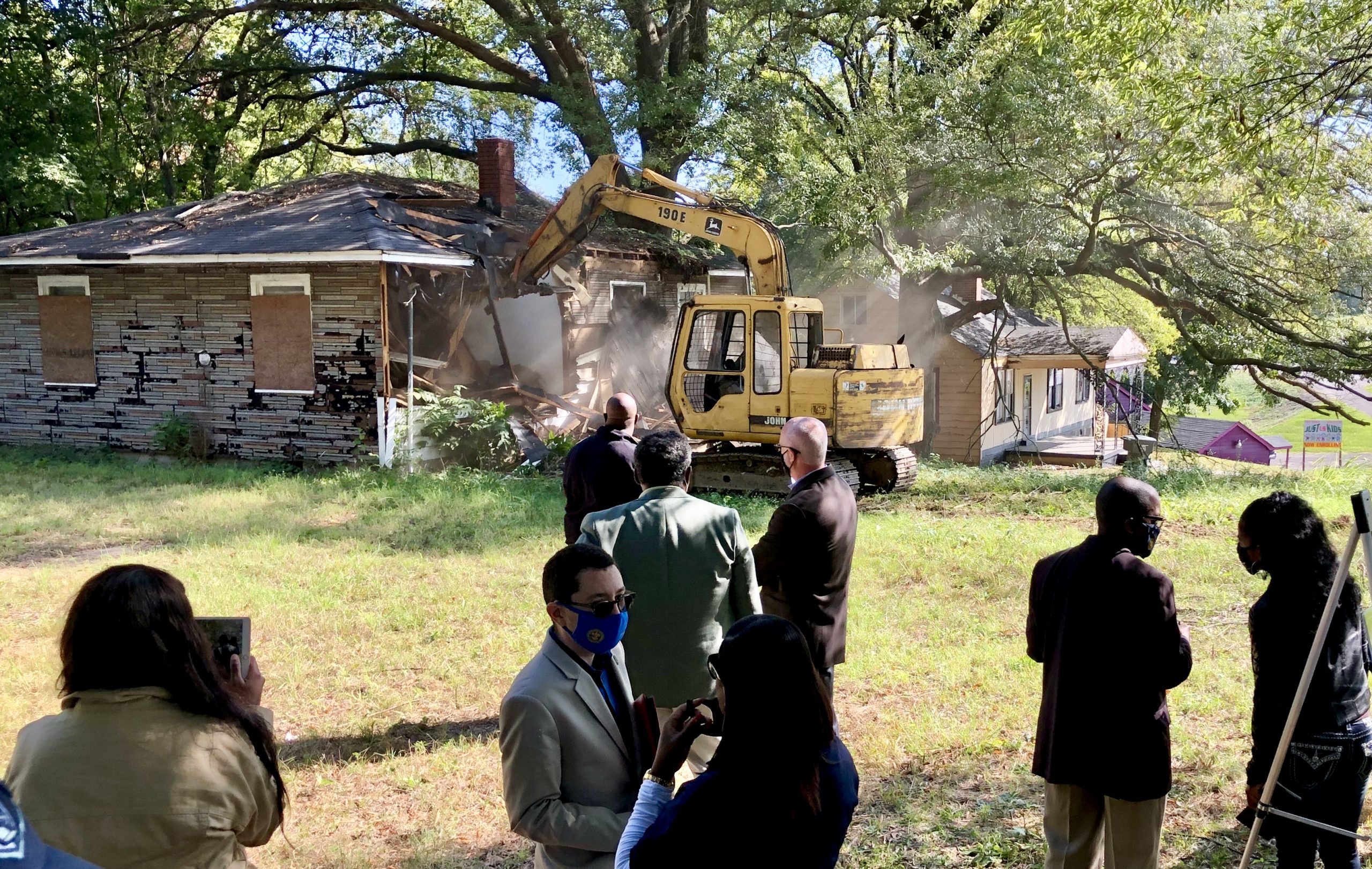Friday, October 2nd, Alcy-Ball, Memphis – In the crisp cool air of a bright fall morning and with the static hum of the I-240 nearby, the Blight Authority of Memphis, nicknamed BAM, convened to demonstrate how the organization “aligns resources to streamline investments to address long-term blighted and troublesome properties,” with a planned demolition of two vacant, derelict houses along the southern curve of East Alcy Road.
“It exists here to transform blighted properties into economic opportunities,” said BAM’s Executive Director Leslie Smith to the tight crowd of community leaders and local media. “It is our vision to reduce the occurrence of blight and its symptoms that threaten the growth of all Memphis neighborhoods.”
In place of the structures, which were subject to recurring code violations, Alcy-Ball will be transforming the parcels into a community garden.
Alcy-Ball has become one of BAM’s targeted areas for collaborative partnerships with neighbors, community organizations, government, and responsible property owners. The Friday morning press conference served to announce and introduce the strategic collaborations and BAM’s efforts throughout Alcy-Ball, and an example of how BAM partners with communities throughout Memphis.
Home demolitions are typically drowsy, solemn affairs. But the dual demolitions Friday morning were as symbolic as they were significant in a celebratory kick-start in the efforts of revitalizing the Alcy-Ball neighborhood – it sits directly north of Interstate 240 on the west side of Airways Boulevard – and neighborhoods like it throughout Memphis.
“This is demolition is a good thing to celebrate, but it’s just a first step,” said Alcy-Ball CDC Executive Director Seth Harkins. “Some more questions to think about: How are we as a city going to create housing that’s safe, attractive and affordable that does not disrupt the fabric of an existing community?”

“We have a long road ahead of us, but we’re taking a step in the right direction,” said Rick Neal, Chair of BAM’s Board of Directors. “Elimination of blight is not just removing something that is negative, but it is economic development. As we eliminate blight, we increase value, making people feel more committed to their neighborhood, paving the way for the future.”
In attendance for the press conference were leaders throughout the community, including representatives from BAM, Neighborhood Preservation, Inc., local Memphis City Council Member Cheyenne Johnson, Shelby County Assessor of Property Melvin Burgess, and Shelby County Commissioner Reginald Milton.
Said Melvin Burgess: “As your Assessor, we’re always glad to see blighted properties being rejuvenated, to put them back on the tax rolls. But we have to work together, and not forget the existing homeowners and what they want to see happen.”
“What you see here is a neighborhood, you see a community, where people live and raise their families,” said Shelby County Commissioner Reginald Milton. “A community is a living thing – it has a birth, it has a growth, and if not nurtured, it has a death. And when we see blight, it is an open sore in the community. If not taken care of, it grows.”
Speaking for not just Alcy-Ball, but so many other neighborhoods like it, Alcy-Ball’s Seth Harkins continued, “How are we as a city going to support existing homeowners who need repairs to stay in their homes, and create pathways to wages that can truly afford a newly constructed house? And how are going to do this with our neighbors and not just for them?”
ABOUT BLIGHT AUTHORITY OF MEMPHIS, INC.
BAM contributes to the growth of prosperous, stable, and affordable communities throughout Memphis. BAM is open to working with Neighborhood-Based Organizations (NBO) and Community Development Corporations (CDCs) throughout the City of Memphis to remediate blight and enhance communities. Any NBO or CDC interested in working with BAM may contact the organization at support@blightauthoritymemphis.org.

In response to the growing blighted conditions in Memphis, on November 3, 2015, City Council established the Blight Authority of Memphis, Inc. (BAM) under Tennessee’s Local Land Bank Program (Tenn. Code Ann. §TCA 13-30). BAM is a quasi-governmental agency that exists to eliminate blight and restore the tax base through serving as the City of Memphis land bank. BAM works to reduce the occurrence of blight and its symptoms that threaten the security, stability, and growth of Memphis’ neighborhoods. By serving as intermediary, BAM leverages its legislated powers to restore formerly vacant properties back into productive use, eliminate barriers to redevelopment, and encourage economic activity to take place throughout Memphis.
This story was published under StoryBoard’s Contributing Sponsor Neighborhood Preservation, Inc.


